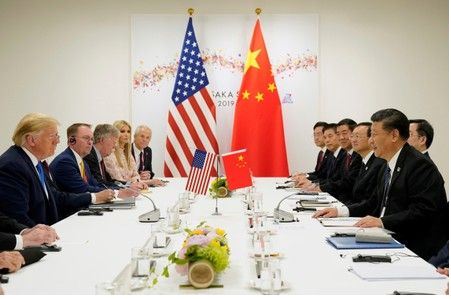Top U.S. and Chinese trade officials met in Shanghai on Wednesday for talks in a bid to end a year-long trade war, despite low expectations for progress and combative remarks from U.S. President Donald Trump.
Trump had said on Twitter that China appeared to be backing off on a pledge to buy U.S. farm goods, and he warned that if China stalled in the hope that he wouldn’t win re-election in the November 2020 U.S. presidential contest, the outcome will be worse for China.
“The problem with them waiting … is that if & when I win, the deal that they get will be much tougher than what we are negotiating now … or no deal at all,” Trump said.
China’s state-owned Global Times tabloid said that U.S. negotiators should show sincerity and hold “reasonable expectations” after making “unrealistic demands that infringe upon China’s sovereignty and dignity”.
It said that if “Washington still holds the illusion that Beijing will somehow cave in and compromise on issues concerning sovereignty and other related core interests to reach a deal, then no deal is fine”.
This week’s meetings, the first in-person trade talks since a G20 truce last month, come as an official survey showed China’s factory activity shrank for the third month in a row in July, underlining the growing strains placed on the world’s second-biggest economy by the trade war.
The trade row has dragged on for more than a year, with the world’s two largest economies slapping billions of dollars of tariffs on each other’s imports, disrupting global supply chains and shaking financial markets.
The Shanghai talks were expected to center on “goodwill” gestures, such as Chinese commitments to purchase U.S. agricultural commodities and steps by the United States to ease some sanctions on Chinese telecoms equipment giant Huawei Technologies Co Ltd.





